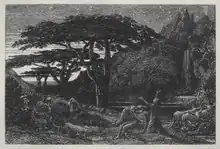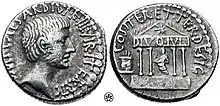Eclogue 5 (Ecloga V; Bucolica V) is a pastoral poem by the Latin poet Virgil, one of his book of ten poems known as the Eclogues. In form, this is an expansion of the first Idyll of Theocritus, which contains a song about the death of the semi-divine herdsman Daphnis.[1] In the first half of Virgil's poem, the goatherd Mopsus sings a song lamenting the death of Daphnis; in the second half, his friend Menalcas sings a song of equal length telling of Daphnis' welcome among the gods, and the rites paid to him as a divinity.[1]
The poem has sometimes been held (though perhaps on too slight grounds) to be allegorical, celebrating the apotheosis of Julius Caesar, which was confirmed by a solemn act passed in BC 42.[1]
Summary

Two herdsmen, Mopsus and Menalcas, meet and engage in a friendly contest, one singing about the death and the other about the deification of Daphnis.[2] The poem is amoebaean, and the 25 lines (20–44) which compose the song of Mopsus are replied to in 25 lines (56–80) by Menalcas.[2] The parallelism of the two songs is very marked: lines 20–23 are parallel to 56–59, 24–28 to 60–64, 29–35 to 65–71, 36–39 to 72–75, and 40–44 to 76–80.[2]
Analysis

Daphnis is the ideal cowherd of pastoral poetry, which he was said to have invented, and his death is sung by Thyrsis in the first Idyll of Theocritus.[2] In Theocritus's poem, the herdsman Thyrsis describes the moments before Daphnis died: the gods Hermes, Priapus, and Cypris (Aphrodite) try to console him and persuade him not to die, but in vain. In Mopsus's song, Daphnis has now died and is being mourned by the nymphs, his mother, and his cattle among others. Menalcas's song goes further and describes Daphnis's ascent to Olympus and the rejoicing that follows.
The deification of Daphnis by Virgil has generally been supposed to describe the deification of Julius Caesar, and to have been written shortly after the order made by the triumvirs in 42 BC for the celebration of his birthday in the month Quinctilis, which was thenceforward called after him Julius.[3] However, many modern critics have pointed out that several elements in the description do not fit well with the life and character of Caesar. Colin Hardie wrote: "The official deification of Julius Caesar is, I would concede, alluded to, but by proposing a better candidate, the archetypal poet who can enchant even inanimate nature."[4]
Menalcas in this poem is thought to represent Virgil, in view of the fact that at the end of the poem he claims to be the author of Eclogues 2 and 3, quoting them by their first lines.
The name Mopsus recurs in Eclogue 8 as the rival lover who stole Nysa from the singer Damon. Otherwise it does not occur in bucolic poetry. In mythology, Mopsus was the name of a famous seer, who, being the son of the prophetess Manto, was the half-brother of Ocnus, the founder of Virgil's home town of Mantua. He appears in this eclogue to be a great rival in song of Amyntas, another youthful singer, who appeared in Eclogue 3 as a favourite of Menalcas, and in Eclogue 2 as having learned his skill in music from Corydon.
In lines 10–11 Menalcas suggests three subjects Mopsus might like to sing about: a love song about Phyllis, some praises of Alcon, or some criticisms of Codrus. In mythology, Codrus was the last king of Athens and Alcon was the son of a king of Athens; another Alcon is mentioned by Ovid (Metamorphoses 13.683) as a craftsman who made a wonderful mixing bowl given to Aeneas by Anius king of Delos. It has been proposed that "Codrus" (who appears again in Eclogue 7, where he is praised by Corydon and criticised by Thyrsis) is a pseudonym for a poet contemporary with Virgil,[5] but nothing is known of Alcon. Neither name is found in Theocritus.
References
- 1 2 3 Greenough, ed. 1883, p. 13.
- 1 2 3 4 Page, ed. 1898, p. 131.
- ↑ Page, ed. 1898, pp. 131–2.
- ↑ C. G. Hardie (1975), "Octavian and Eclogue 1", p. 116, quoted by Kronenberg (2016), p. 31.
- ↑ Nisbet, R. G. (1995). "Review of WV Clausen, A Commentary on Virgil, Eclogues". The Journal of Roman Studies, 85, 320–321.
Sources
Attribution: ![]() This article incorporates text from these sources, which are in the public domain.
This article incorporates text from these sources, which are in the public domain.
- Greenough, J. B., ed. (1883). Publi Vergili Maronis: Bucolica. Aeneis. Georgica. The Greater Poems of Virgil. Vol. 1. Boston, MA: Ginn, Heath, & Co. pp. 13–15.
- Page, T. E., ed. (1898). P. Vergili Maronis: Bucolica et Georgica. Classical Series. London: Macmillan & Co., Ltd. pp. 131–9.
Further reading
- Lee, Guy (1977). "A Reading of Virgil's Fifth Eclogue". Proceedings of the Cambridge Philological Society. 23 (203): 62–70.
- Kronenberg, L. (2016). "Epicurean Pastoral: Daphnis as an Allegory for Lucretius in Vergil’s Eclogues". Vergilius (1959-), 62, 25–56.
- Pulbrook, Martin (1978). "Octavian and Virgil's Fifth 'Eclogue'". The Maynooth Review / Revieú Mhá Nuad. 4 (2): 31–40.